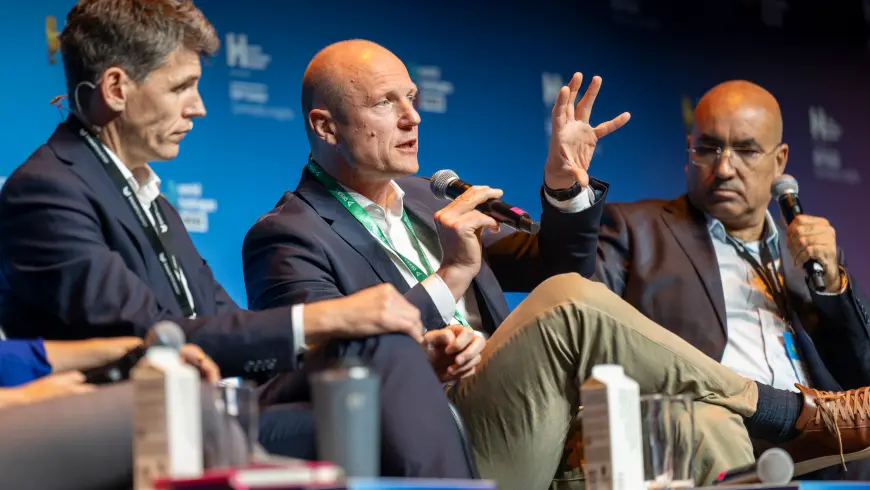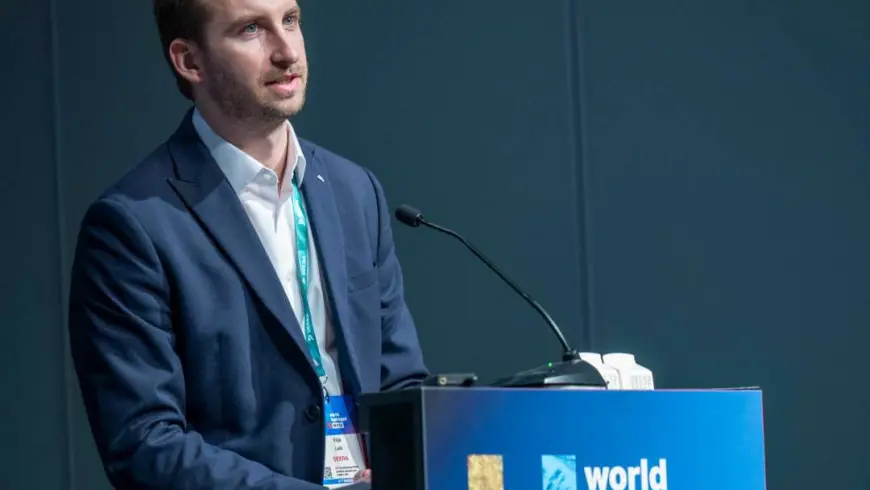World Hydrogen Week 2024
The World Hydrogen Congress (WHC) 2024 in Copenhagen emphasized the crucial role hydrogen will play in the global energy transition. DEKRA CEO Stan Zurkiewicz, Policy Officer Elija Leib and Christoph Flink, Vice President Hydrogen Program Management, participated in panel discussions and presentations. Their contributions around WHC made clear: while the potential of hydrogen is immense, its full realization depends on effective risk management, international cooperation, and streamlined regulatory frameworks to create a safe, reliable, and scalable hydrogen ecosystem.
About Green Hydrogen


DEKRA Speakers
Stan Zurkiewicz
DEKRA CEO
Dr. Christoph Flink
Vice President Hydrogen-Economy Program
Elija Leib
Senior Policy Manager European Sustainability Policy
Global Approaches to Green Hydrogen
This discussion explores global strategies for developing scalable and cost-efficient green hydrogen projects. It addresses key issues such as cost reduction, risk management, water security, and the challenges of technology and project bankability. The session also considers the influence of more affordable Chinese electrolyzers and highlights the role of international collaboration in advancing large-scale hydrogen production and distribution.
Stan Zurkiewicz, DEKRA CEO
DEKRA’s CEO Stan Zurkiewicz stated, that, as the leading Testing, Inspection, and Certification company dealing with safety, security and sustainability of people, products, assets, processes and systems, DEKRA stands at the core of the energy transition. In a panel discussion during WHC, he underscored hydrogen’s position as the cornerstone of this transformation.
DEKRA's part in the Energy Transition
Together, we must ensure that both the physical and digital infrastructure of hydrogen projects are optimized for safety and scalability.
Stan Zurkiewicz, CEO DEKRA
Examination of Regulatory Challenges
A comparison of regulatory approaches governing testing, inspections and certifications, for a safe, secure and sustainable hydrogen economy. This presentation outlines what's next in regional regulations and their interoperability, from additionality and time matching to resolving legal discrepancies across jurisdictions. We explore how current regulation is shaping the future of green energy - and what is needed to speed up the transition to a carbon neutral economy.
Elija Leib
Insights Into the Regulatory Landscape
This presentation by DEKRA expert Elija Leib provided a comparative analysis of the regulatory approaches to testing, inspection, and certification, which are essential to a safe and sustainable hydrogen economy.
Trust and Simplicity as the Key
To establish a safe and sustainable hydrogen economy, a simple and harmonized regulatory framework is the key to success: Elija Leib, DEKRA Senior Policy Officer, pointed this out in his presentation on October 2, 2024, during the WHC 2024. The expert sees trust in safety, security and sustainability as a basic requirement. His thesis is that this must not be hindered by overly complex regulation.
Excessive Complexity Due to National, EU and US Regulation
The current high complexity of the regulatory landscape must not be allowed to stand in the way: there are currently national regulatory frameworks for hydrogen production, hydrogen certification, pipeline retrofitting, storage and hydrogen refueling stations (HRS) and industrial applications. Between the EU and US regulations alone, there are fundamentally different incentive systems for investment and for pricing green hydrogen.
Pathway to the Hydrogen Economy
This discussion will explore the feasibility of a direct transition to green hydrogen from a fossil fuel-dependent system. We will address key challenges such as high production costs and inadequate infrastructure. Additionally, we’ll consider the role of low-carbon hydrogen options, like nuclear and natural gas with CCS, and if integrating blue hydrogen alongside green alternatives can facilitate a smoother, scalable transition to green hydrogen from renewable sources.
Dr. Christoph Flink
Direct Transition Towards a Green Hydrogen Economy Is Moving Too Slow
Dr. Christoph Flink, responsible for the strategy and implementation of DEKRA’s services along the supply chain for hydrogen, and the panel provided a reality check on the current status of the hydrogen economy, emphasizing that the transition towards a green hydrogen economy is progressing too slowly. He pointed out that policies are not advancing quickly enough to create reliable conditions for green hydrogen offtake commitments, which are essential for unlocking necessary investments.
Two conflicting policy philosophies were identified:
- Market-Driven Approach
This approach suggests that government policies should only define economic boundaries, allowing the industry and markets to determine the technologies needed to achieve a Net Zero economy. - Government-Led Approach
This approach argues that political decisions should guide technology choices and support the installation of necessary infrastructure, as markets require direction to move forward efficiently.
Cost Reduction Pathway Needed:
Green hydrogen remains too expensive, and a clear policy pathway is needed to reduce costs while climbing down the learning curve.
Slow Policy Delays Bankable Projects:
Investor Confidence Requires Clarity:
Blue Hydrogen – Bridge to Green Transition:
I strongly advocate for a global forum on hydrogen safety and risk management, where certification bodies like DEKRA can lead the way. Let’s continue to push for robust protocols to make the hydrogen industry scalable, sustainable, and safe.
Stan Zurkiewicz, CEO DEKRA
Get in touch with DEKRA's Experts for Hydrogen and Sustainability Services.
Contact Us

